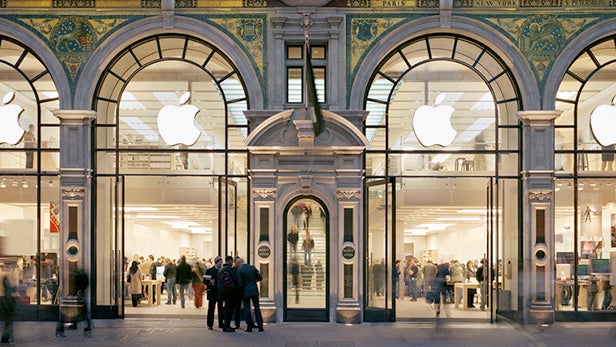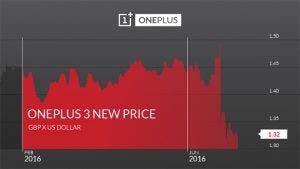Brexit and Big Tech: Will the price of an iPhone rise? We ask the experts

The UK has voted to leave the European Union. Markets are panicked, Westminster has gone AWOL, and Brits are left desperate for answers. Answers to questions like this…
Does Brexit mean smartphones and gadgets will cost more?
As Britain embarks on its slow, awkward drift away from the European Union, the consequences for UK smartphone users are becoming increasingly obvious. This week, Chinese phone maker OnePlus announced that we Brits can expect an imminent price hike for the OnePlus 3 smartphone – from £309 to £329 – blaming the topsy-turvy roller-coaster that is the GBP-USD exchange rate.
 Global iPhone shipments amounted to 44 million units in the first quarter of 2016
Global iPhone shipments amounted to 44 million units in the first quarter of 2016
“We’ve seen a downward trend for the Pound against the USD over the past few months,” explained a OnePlus spokesperson, ominously. “While we’ve held off action for as long as we can, the sharp drop witnessed in the currency markets following the Brexit decision has forced us to re-evaluate the OnePlus 3’s pricing in the UK at a time of significant demand.”
OnePlus said that it didn’t want customers to be blindsided, and that if we’re thinking of buying, it “recommends doing so sooner rather than later” – before July 11, specifically. Cynics were quick to label the statement as a marketing ploy, but OnePlus responded with the following:
“Given the effects of the unstable markets on our extremely thin margins, we’re reluctantly going to have to make some small changes to our pricing structure for the [OnePlus 3]. There’s still time to pick up the device at the current price of £309. We said that we’d give you as much notice as possible, and we’re committed to taking the hit over the next few days and absorbing the resulting losses.”

Related: iPhone 7
It’s not the first time this has happened either; OnePlus previously kicked up retail costs in Europe at the start of 2015, when the Euro hit a nine-year low against the dollar. The decision was taken “reluctantly”, but OnePlus cautioned: “If we sell at a loss, the simple fact is that there won’t be a OnePlus in the future”.
But wait – OnePlus is based in Shenzhen, China, a far cry from our green and pleasant land. Is the impact so stark closer to home?
‘Ugh’
“My alarm clock goes off every day at 5:30am as I commute quite a long way. On Brexit result day, I missed the train. I was just staring at my phone, lying in bed going ‘ugh’,” says Nick Muir, CEO of Wileyfox, speaking to TrustedReviews.
Wileyfox is a British smartphone manufacturer headquartered in London and founded just last year. It’s launched five handsets to date, and was named Challenger Manufacturer of the Year at this year’s Mobile News Awards. As a fresh face in the industry, it’s no surprise that Wileyfox fears a post-Brexit future.
 Wileyfox CEO Nick Muir is worried about Brexit
Wileyfox CEO Nick Muir is worried about Brexit
“The biggest short term challenge is the exchange rate in the UK. The longer term challenges include investment,” Muir explains. “If we were manufacturing in the UK, we’d be having serious issues right now. I really feel for anyone that is in that position. For us moving forwards, we need to make sure we’re in the best place for Wileyfox as a business.”
He adds: “We’re not finished with the ramifications of Brexit by a long way.”
Muir’s concerns are echoed by Howard Saycell, CEO of Retra, the UK’s leading trade association for electrical retailers. Saycell recently outlined his expectations for what’s next in an article for ERT, writing: “The fall in the value of the pound will, I believe, lead inevitably to price increases and will be a challenge for many of the [electrical] manufacturers.”
“But if we are honest, some price increases may actually be a good thing for our industry,” he continued. “We have all agreed for many years that we sell wonderful technology at far too low a price? Perhaps this presents us with an opportunity? There will be a bumpy ride, as the whole economy goes through this big transitionary period, but we will come through it.”
Saycell added: “The big question is how long will it take? Has anybody got a crystal ball?”
Brexit: There’s no app for that
The consequences of Brexit aren’t limited to physical goods, however. In 2015, we spent over £15 billion in the Apple App Store – software is big business. But we could be forced to spend even more on apps this year as a result of the dodgy Pound. That’s according to Nicolas Beraudo, the MD for Europe at research firm App Annie:
“The costs of apps in the app stores may change, but it’s less to do with Brexit than it is to do with the Dollar – Pound exchange rate fluctuations. For example, the price of apps in Russia increased when the currency went down last year and, should the GBP fall significantly then the same increase may happen.”
“If the British Pound or other currencies remain weak, then it would not be unusual for the stores to adjust the local currency equivalent for the different price tiers to reflect the new foreign exchange rate,” Beraudo tells TrustedReviews.
“People have been attributing the recent fall of the GBP to Brexit, whereas in fact, as Mark Carney [the governor of the Bank of England] has explained, it has more to do with the volatile Euro and its effect on the foreign exchange rate.”
End times? Not quite
It’s not all fire and brimstone, mind. Stuart Conroy, mobile expert and founder of Activ8, a UK company that prepares mobile start-ups for retail, tells us that Brexit shouldn’t have a significant impact on the price of phones, although he says that companies “who held stock in the UK” will be better off in the short-term. He also said that it’s unlikely we’ll see a hike in the price of apps any time soon:
“I don’t think so. We always tend to pay more than other countries anyway. We’ve got such heavy usage, they know it’s a market that relies on it.”
Related: iPhone 8
However, Conroy says that whether prices shift or not, consumers will still be cautious about departing with significant amounts of cash: “Our experience when we had the recession was that people were actually going out and spending more on lower value items. There’s more concern for the big spends, TVs and the like.”
 Apple’s iPhone 6S starts at £539 – is that too high for newly budget-conscious consumers?
Apple’s iPhone 6S starts at £539 – is that too high for newly budget-conscious consumers?
So, will the iPhone cost more?
As with all economic flux, it’s hard to say for sure. Apple has raised app prices regionally in the past due to changes in exchange rate, but we’ve yet to see a post-Brexit hike. This week, we saw sterling plummet to thirty year lows, although there have been signs of a “bounce back” in recent days. Whether we’ll regain all of that lost ground is up for debate.
On Wednesday, Shaun Osborne, Chief Currency Strategist at Scotiabank, told Market Watch that the British pound could hit parity – i.e. equal value – with the US dollar by the end of the year, or early in 2017, adding: “We think investors should be prepared for the risk of [pound] weakness extending quite significantly in the next few months, while uncertainty surrounding how the UK moves forward persists.”
It comes down to this: If Apple gets fewer dollars for every pound we spend, that’s bad for business. If that issue becomes sustained, Apple – and all other businesses dealing in the UK – will have to consider if their pricing strategy for Britain stills works.
We can’t guarantee that the iPhone price will rise post-Brexit, but we can’t guarantee that it won’t either.
Apple did not respond to our request for comment. LG declined to comment. Samsung declined to comment. UK mobile retailer Clove declined to comment.
Watch The Refresh: The latest tech news every week
Will the referendum result affect your spending habits? Let us know in the comments.


